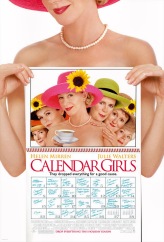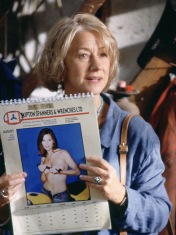|
Calendar Girls
|
| |
 |
UK, 2003. Rated PG-13. 108 minutes.
Cast:
Helen Mirren, Julie Walters, John Alderton, Annette Crosbie, Philip Glenister, Ciarán Hinds, Celia Imre, Penelope Wilton, Linda Bassett, Georgie Glen, Angela Curren, Rosalind March, Geraldine James, Philip Glenister
Writers: Tim Firth, Juliette Towhidi
Original Music: Patrick Doyle
Cinematography: Ashley Rowe, Oliver Curtis
Producers: Suzanne Mackie, Nick Barton
Director: Nigel Cole
LINKS
|
"Pretty much every year the ailing British film industry coughs up a feel-good movie of comfortable familiarity and pan-demographic appeal whose critical and commercial success is disproportionate to its modest production and ambition."
 o began my AboutFilm review of Bend It Like Beckham earlier this year, recycled here in the same groundbreaking spirit as director Nigel Cole has made Calendar Girls, an over-egged pudding of a film that is an amiable, if wholly unremarkable, way to spend a couple of hours. Amiable in much the same way as finding oneself on an airplane with a garrulous but harmless seatmate—unremarkable in the way that a brisk shake of the hand and a "nice to have met you" will suffice, as far as extending the relationship is concerned. By the time you pull out of the Hertz lot in a shiny Taurus, you'll remember that you met, but little of what was said. And that's Calendar Girls, in one unwieldy metaphor.
o began my AboutFilm review of Bend It Like Beckham earlier this year, recycled here in the same groundbreaking spirit as director Nigel Cole has made Calendar Girls, an over-egged pudding of a film that is an amiable, if wholly unremarkable, way to spend a couple of hours. Amiable in much the same way as finding oneself on an airplane with a garrulous but harmless seatmate—unremarkable in the way that a brisk shake of the hand and a "nice to have met you" will suffice, as far as extending the relationship is concerned. By the time you pull out of the Hertz lot in a shiny Taurus, you'll remember that you met, but little of what was said. And that's Calendar Girls, in one unwieldy metaphor.
Inspired by the true story of the Rylstone Women's Institute—a social organization dedicated to the preservation of "traditional" domestic arts and crafts—the film belongs in that genre of mildly diverting British films whose premise invariably juxtaposes two incongruities stretched thinly across two hours or so. In other words, file alongside The Full Monty (unemployed steelworkers become male strippers), Billy Elliot (son of coal miner becomes ballet dancer), Saving Grace (middle-class, middle-aged widow becomes marijuana farmer), Bend It Like Beckham (Asian girl from traditional family becomes professional soccer player), and Greenfingers (prison inmates become champion horticulturists), et al., seemingly ad nauseam.
To raise money for the local hospital that cared for her terminally-ill husband, WI member Annie (Julie Walters) and her mischievous best friend Chris (Helen Mirren), hope to boost sales of their annual WI fundraising calendar by adding a little "spice" for a change. Although featuring the Institute's women engaged in traditional activities such as baking cakes, cider pressing, and flower arranging, Chris cajoles her posse of pear-shaped fifty-somethings into posing nude for the photographs. A terribly risqué proposition, this, in that peculiarly English, nudge-nudge, wink-wink, kind of way.

Helen Mirren has an idea for a fundraiser in Calendar Girls |
In real life, the "Calendar Girls" became something of a British media phenomenon, even making the front page (above the fold!) of the New York Times, and were featured on CBS' 60 Minutes. By 2003, nearly 300,000 calendars had been sold, raising the greater part of a million dollars for leukemia research. Which, it goes without saying, is incredibly worthy and good. However, "worthy" and "good" are hardly cornerstones of engaging drama, prompting Cole and writers Tim Firth and Juliette Towhidi to create some "paper tigers" (their words) to add much-needed dramatic tension.
Of course, the problem with paper tigers is that they are made of paper, and, unless you are Roy Horn, it's unlikely they will create much tension, let alone enough to propel a story through 108 minutes. So it is with Calendar Girls, which like Bend It Like Beckham in particular, suffers from a surfeit of overwritten, faux-dramatic sub-plots that fail to compensate for the paucity of the story. Heartwarmingly—if it takes so little to warm your heart—the Calendar Girls cope with their artificial tribulations (waiting in the wrong check-in line at the airport! Quel horreur!) with a touch of daring, with compassion, and with the ability to laugh as easily at themselves as they do each other. All of which may raise a smile and bring a tear to your eye, but like the film itself, both will be as throw-away as last year's calendar.
Well-worn though it is, the formulaic dramatic arc is not the critical weakness of Calendar Girls. The critical weakness here—in fact, the weakness common to all the films mentioned earlier, with the exception of The Full Monty—is a lack of credible dramatic tension. For “dramatic arc,” read “dramatic flatline.” The stakes are just not high enough to justify the inevitable “feel-good” pay-off. In these terms, Calendar Girls doesn't belong in the cinema; the natural home for such fey fripperies is television. Unfortunately, the economic stakes of British filmmaking have their own tension, meaning that virtually any film that gets made must be released theatrically, regardless of merit.
The whys and wherefores of this situation are beyond explanation here, although one cannot overlook the demise of in-house BBC film production, the abandonment of “quality” drama programming by ITV, and the collapse of Channel Four Film. However, one result is that films of exceedingly modest caliber are propagated beyond “mere” domestic TV audiences and into our cinemas.
After all, the formula works, so who cares if the product is any good?
Review © December 2003 by AboutFilm.Com and the author.
Images © 2003 Touchstone Pictures. All Rights Reserved.


